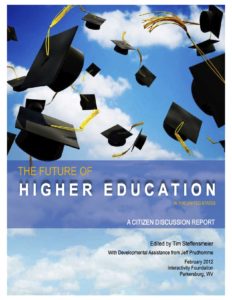 Who has responsibilities for higher education? What are different ways to envision these responsibilities? Eleven discussion participants came together using the Zoom videoconferencing platform for a mini-series of discussions to explore questions such as these. The goal for these discussions was to develop some of the core questions that might help people look at this topic from a range of viewpoints. We wanted to expand the way people might consider this topic. We wanted to explore some of the competing responsibilities that might come into view by looking at responsibilities for higher education from different perspectives. This mini-series is intended to supplement IF’s existing discussion guide on The Future of Higher Education, which explores different ways to envision the purpose of higher education.
Who has responsibilities for higher education? What are different ways to envision these responsibilities? Eleven discussion participants came together using the Zoom videoconferencing platform for a mini-series of discussions to explore questions such as these. The goal for these discussions was to develop some of the core questions that might help people look at this topic from a range of viewpoints. We wanted to expand the way people might consider this topic. We wanted to explore some of the competing responsibilities that might come into view by looking at responsibilities for higher education from different perspectives. This mini-series is intended to supplement IF’s existing discussion guide on The Future of Higher Education, which explores different ways to envision the purpose of higher education.
In this series, we wanted to expand the discussion of possible stakeholders. When we talk about higher education, it’s easy to focus on faculty and students. But how can we expand our lens to consider other stakeholders? What obligations do campus administrators and staff have? What about other institutions such as academic publishers, academic or professional associations, or financial aid providers? If higher education is something that benefits the population as a whole, what public responsibilities are there for higher education? What responsibilities are there for governments, whether at the state, national, or international levels for higher education? What about private sector responsibilities? What about non-profits and philanthropic organizations?
We also wanted to draw into view some of the complexities that might emerge surrounding responsibilities for higher education. For example, faculty have obviously have responsibilities for things like the quality of instruction and for scholarship. But what responsibilities do they have for mentoring and advising—things that are vital for student success but are usually not given similar consideration when it comes to tenure and promotion decisions? Students are obviously responsible for taking ownership of their learning, but what responsibilities do they have to contribute positively to campus life or to the surrounding community? If public colleges and universities are obligated to serve the benefit of the people of their state, what mechanism is there for these schools to know what the interests of the people are? Who has a say in what benefits the community? If the public has an obligation to support higher education, then should they also have a say in higher education? Who does benefit from higher education—and what obligations might attend these benefits?
The discussion participants formed two separate teams that each met for a pair of facilitated one-hour conversations that took place in October and November 2017. The participants represented a mix of faculty, staff, and students (including an international student from China). They were from a mix of public and private schools in Idaho, Minnesota, Georgia, Alabama, Maryland, and West Virginia. The results of the conversations will be synthesized as a set of core questions that could be used for dialogues exploring different perspectives surrounding the question of responsibilities for higher education.



